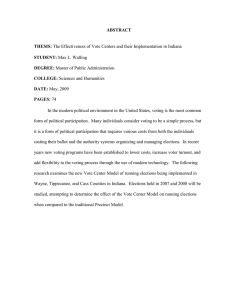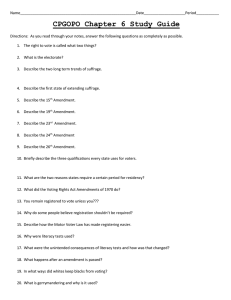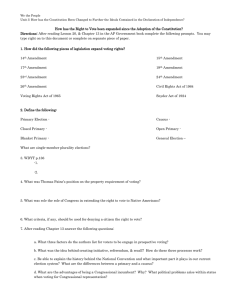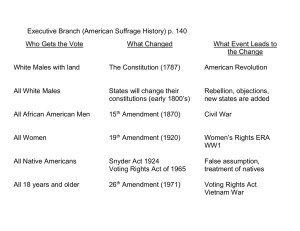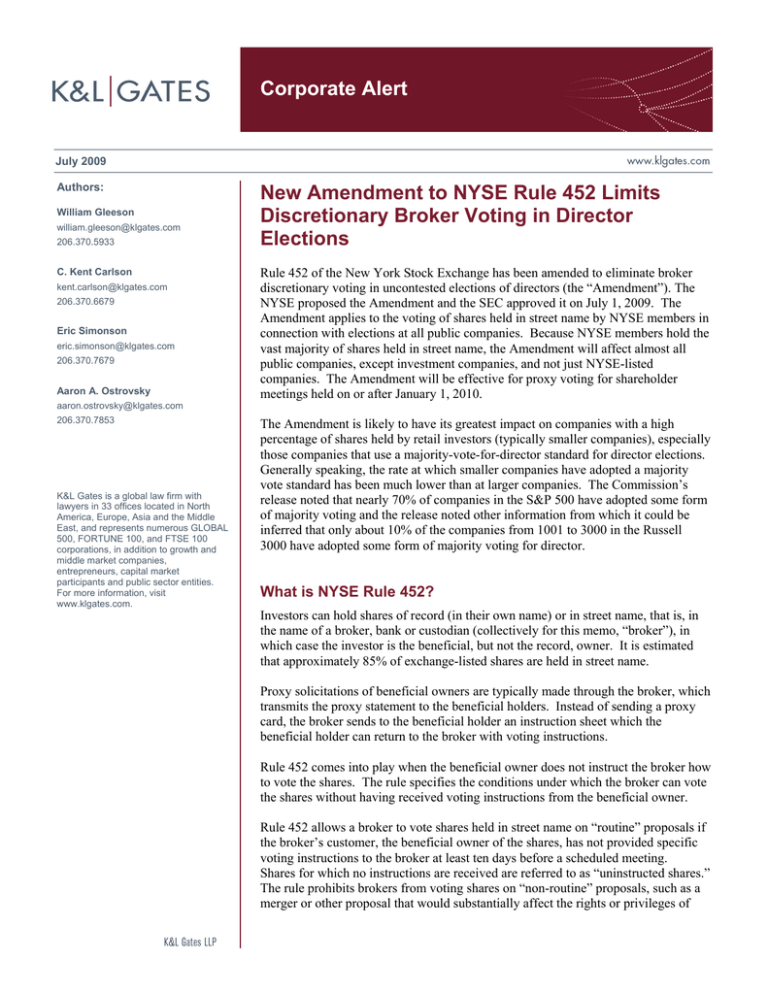
Corporate Alert
July 2009
Authors:
William Gleeson
william.gleeson@klgates.com
206.370.5933
C. Kent Carlson
kent.carlson@klgates.com
206.370.6679
Eric Simonson
eric.simonson@klgates.com
206.370.7679
Aaron A. Ostrovsky
aaron.ostrovsky@klgates.com
206.370.7853
K&L Gates is a global law firm with
lawyers in 33 offices located in North
America, Europe, Asia and the Middle
East, and represents numerous GLOBAL
500, FORTUNE 100, and FTSE 100
corporations, in addition to growth and
middle market companies,
entrepreneurs, capital market
participants and public sector entities.
For more information, visit
www.klgates.com.
New Amendment to NYSE Rule 452 Limits
Discretionary Broker Voting in Director
Elections
Rule 452 of the New York Stock Exchange has been amended to eliminate broker
discretionary voting in uncontested elections of directors (the “Amendment”). The
NYSE proposed the Amendment and the SEC approved it on July 1, 2009. The
Amendment applies to the voting of shares held in street name by NYSE members in
connection with elections at all public companies. Because NYSE members hold the
vast majority of shares held in street name, the Amendment will affect almost all
public companies, except investment companies, and not just NYSE-listed
companies. The Amendment will be effective for proxy voting for shareholder
meetings held on or after January 1, 2010.
The Amendment is likely to have its greatest impact on companies with a high
percentage of shares held by retail investors (typically smaller companies), especially
those companies that use a majority-vote-for-director standard for director elections.
Generally speaking, the rate at which smaller companies have adopted a majority
vote standard has been much lower than at larger companies. The Commission’s
release noted that nearly 70% of companies in the S&P 500 have adopted some form
of majority voting and the release noted other information from which it could be
inferred that only about 10% of the companies from 1001 to 3000 in the Russell
3000 have adopted some form of majority voting for director.
What is NYSE Rule 452?
Investors can hold shares of record (in their own name) or in street name, that is, in
the name of a broker, bank or custodian (collectively for this memo, “broker”), in
which case the investor is the beneficial, but not the record, owner. It is estimated
that approximately 85% of exchange-listed shares are held in street name.
Proxy solicitations of beneficial owners are typically made through the broker, which
transmits the proxy statement to the beneficial holders. Instead of sending a proxy
card, the broker sends to the beneficial holder an instruction sheet which the
beneficial holder can return to the broker with voting instructions.
Rule 452 comes into play when the beneficial owner does not instruct the broker how
to vote the shares. The rule specifies the conditions under which the broker can vote
the shares without having received voting instructions from the beneficial owner.
Rule 452 allows a broker to vote shares held in street name on “routine” proposals if
the broker’s customer, the beneficial owner of the shares, has not provided specific
voting instructions to the broker at least ten days before a scheduled meeting.
Shares for which no instructions are received are referred to as “uninstructed shares.”
The rule prohibits brokers from voting shares on “non-routine” proposals, such as a
merger or other proposal that would substantially affect the rights or privileges of
Corporate Alert
the shares, without specific voting instructions from
the beneficial owner.
Rule 452 is applicable to NYSE members, primarily
brokers and banks, and regulates their conduct in
voting shares held in street name for customers.
Rule 452 regulates the brokers’ voting of shares of
all companies, not just those listed on the NYSE.
The rule does not regulate the conduct of companies
listed on the NYSE.
What Changes Does the Amendment
Make Regarding Director Elections?
Contested elections. It has long been established
under Rule 452 that a contested election of directors
is “non-routine.” A contested election is one in
which there is a competing slate of directors and a
counter-solicitation opposed by management. In
contested elections, brokers cannot vote uninstructed
shares. The Amendment does not change broker
voting in contested elections.
Uncontested elections. In the past, an uncontested
election of directors was considered “routine” under
Rule 452 and accordingly brokers could vote
uninstructed shares. The Amendment makes an
uncontested election “non-routine,” eliminating
brokers’ ability to vote uninstructed shares in such
an instance.
Vote no or withhold vote campaigns. The
NYSE’s long-standing position has been that a “just
vote no” or withhold vote campaign (collectively,
“Just Vote No Campaigns”) does not transform an
election of directors into a contested election. The
rationale is that a Just Vote No Campaign does not
involve a competing slate of directors or a formal
counter-solicitation. In a Just Vote No Campaign,
the dissident shareholder seeks to have shareholders
either vote against the board’s nominees or withhold
authority to vote for the board’s nominees, but in
either case using the company’s proxy card. The
dissident shareholder engaging in a Just Vote No
Campaign does not solicit proxies giving the
dissident shareholder the power to vote the shares
for a competing slate of directors, which has been
the key requirement for classifying an election as
“non-routine.”
As a result of the Amendment, elections involving a
Just Vote No Campaign are considered “nonroutine.”
Why Did the SEC Approve the
Amendment?
Underlying the SEC’s approval of the Amendment
was the Commission’s belief, as expressed in its
release approving the Amendment, that
The election of directors is not a “routine” issue
for either the corporation or the shareholders; it
is a key event in the operation and direction of
the corporation and the shareholders’ exercise
of their rights and interests as owners of the
corporation.
From this principle and taking note of the fact that
there is concern that brokers typically support
management disproportionately over dissidents, it
follows, according to the release, that the
Amendment should “better enfranchise
shareholders” by taking voting decisions away from
brokers who have no “economic interest in the
company.” The SEC reasoned that eliminating
voting by those with no economic interest should
“enhance corporate governance and accountability
to shareholders.”
The SEC noted that in certain Just Vote No
Campaigns, presumably in elections requiring a
majority of votes cast, it appeared that broker
discretionary voting for the management slate “has
made the difference and allowed directors subject to
these campaigns to be elected.”
It further noted that even in situations where broker
discretionary voting did not change the result of an
election, the typically disproportionate support of
management could create “a perception that a
candidate or group of candidates has greater
support” than would be the case without broker
discretionary voting. This can lead to a failure to
understand that the directors suffer from a “lack of
substantial support” and that in turn can
inappropriately “affect decisions of the board and
shareholders.”
July 2009
2
Corporate Alert
Is There an Exemption from the
Amendment?
Voting in director elections for registered investment
companies is exempt from the Amendment. Brokers
can continue to treat elections at registered
investment companies as routine and vote
uninstructed shares.
The SEC rejected exemptions for smaller issuers,
business development companies, and master
limited partnerships. The Commission “recognizes
that small issuers could face similar concerns as
registered investment companies,” but refused to
exempt them from the Amendment because of “the
unique regulatory scheme governing investment
companies.”
who hold shares in street name provide voting
instructions to the broker at rates significantly
below institutional shareholders. Companies that
have a large percentage of retail record or beneficial
shareholders would likely include smaller
companies, which typically having a smaller
proportion of institutional investors.
Just Vote No Campaigns. The Amendment
could have a significant impact on the frequency
and effectiveness of Just Vote No Campaigns.
•
Majority-Vote-For-Director Elections. The
impact may be most pronounced at companies
having a majority-vote-for-director election
standard. The typical provision requiring a
majority vote requires that a director receive a
majority of votes cast to be elected. Under Rule
452 before the Amendment, a broker could vote
uninstructed shares and they would be votes
“cast.” After the Amendment, uninstructed
shares cannot be votes “cast.” Traditionally,
broker discretionary votes have been voted
heavily in favor of the board’s nominees,
making it easier to achieve a majority vote.
The Amendment is likely to enhance the
effectiveness of Just Vote No Campaigns in the
context of a majority-vote-for-director
provision and could lead to the defeat of the
board’s nominees and this in turn could lead to
an increase in the frequency of Just Vote No
Campaigns. In its release approving the
Amendment, the SEC downplayed the
significance of the Amendment on elections
requiring a majority vote, noting that one study
found that only 2 nominees out of 2,718 failed
to receive a majority vote without broker
discretionary voting. Nevertheless, the
Commission did concede the Amendment “may
make it somewhat more difficult for a director
in a majority vote company to survive a ‘just
vote no’ or similar campaign.”
•
Plurality Elections. The Amendment could also
have a significant impact on Just Vote No
Campaigns even where the election standard is
a plurality of the votes cast. While the Just Vote
No Campaigns would not lead to the defeat of
the board’s nominees, the Amendment could
What is the Effect on Non-NYSE
Members?
Rule 452 affects proxy voting by members of the
NYSE, who account for the vast majority of shares
held in street name. However, there are brokers who
are not members of the NYSE.
AMEX Rule 577 is applicable to AMEX members
and historically has substantially mirrored Rule 452.
It can be expected that AMEX will file for a rule
change similar to the Amendment. In any case, an
AMEX member that is also a NYSE member is
subject to Rule 452.
NASD Rule 2260 does not permit broker voting
except in accordance with the rules of an exchange
of which the brokers are members. FINRA
members are subject to Rule 2260 and the Rule
requires that the brokers send beneficial owners a
proxy card as opposed to an instruction sheet.
However, a FINRA member that is also a NYSE
member is subject to Rule 452.
What will be the Impact of the
Amendment?
The Amendment is likely to have its greatest impact
on companies with a high percentage of shares held
by retail investors. Retail investors who hold shares
of record vote at rates significantly below
institutional shareholders. Similarly, retail investors
July 2009
3
Corporate Alert
lead to embarrassing situations where the board
nominees do not receive a majority of the votes
cast or, even if they do, the majority is small.
Quorum at Shareholder Meetings. A quorum at
a shareholder meeting is established by the presence
of shares eligible to vote, whether in person or by
proxy. Shares are considered present where a broker
votes a customer’s shares pursuant to a proxy and
the only matter voted on in the proxy is voted
pursuant to broker discretionary voting. Thus,
where the only matter to be voted on was an
uncontested election of directors, the broker could
vote because the matter was routine and the voted
shares would be deemed present. After the
Amendment, if the only matter to be voted on is an
uncontested election, the broker cannot vote the
customer’s shares and such shares are not present for
quorum purposes.
It is likely that companies will put more “routine”
proposals on their proxy cards (such as the
ratification of auditors) in order to assure that there
will be broker discretionary voting on at least one
matter at the meeting and the customer shares can be
deemed present for quorum purposes.
What are the Challenges Created by
the Amendment?
The SEC’s position is that the Amendment will
“better enfranchise shareholders.” It is well
documented that the voting rates of retail
shareholders can be quite low. Some companies
have relied on broker discretionary voting to
establish quorums and to provide support for the
board’s nominees for directors.
Before the Amendment, brokers could use their
discretion in voting the shares of customer/beneficial
owners in elections if the beneficial owners did not
provide instruction as to how to vote. That solution,
however, had, in the SEC’s view, undesirable
consequences: broker discretionary voting resulted
in voting decisions being made by brokers having no
economic interest in those shares and this in turn
could have a distorting effect on elections in general
and especially those involving Just Vote No
Campaigns. The Commission’s action eliminates
those undesirable consequences.
To make up for the lost broker discretionary votes,
companies will have to increase voting rates for
retail shareholders. This may not be an easy task.
Not only are voting rates by retail shareholders low,
but surveys show that most retail shareholders who
own shares held in street name do not understand
that brokers have had the power to, and did, vote
uninstructed shares. The problem is particularly
acute in the area of investment companies, where
98% of the shares are held by retail investors and
the low level of participation by retail investors is
more likely to result in the failure to obtain a
quorum.
As for a solution to the problem of low participation
in elections by retail investors, the SEC said only
that it “encourages [brokers] to implement an
investor education effort to inform investors about
[the Amendment], the proxy voting process, and the
importance of voting.” In the near term, it is likely
that many companies will have to step up efforts to
increase voting by retail shareholders, efforts that
are likely to increase the costs of the proxy process,
perhaps significantly.
Were there Alternative Approaches
that the SEC Rejected?
There were other possible approaches to the
concerns that the Commission identified, but none
of these approaches were included in the
Amendment. These approaches would have taken
discretion on how to vote away from the broker but
assure that the shares are voted. These included:
•
Proportional Voting. Beginning in 2007, at
least ten of the largest brokers, representing
more than 40% of the market, have instituted
proportional voting policies for voting
uninstructed shares. Those brokers vote
uninstructed shares in the same proportion as
the actual retail vote of shares for which
instructions are received.
•
Client Directed Voting. When an investor
opens a brokerage account, the investor would
be allowed (but not required) to provide a "good
until cancelled" instruction on matters to be
voted on at companies in which they own
July 2009
4
Corporate Alert
stock. Investors would be permitted to elect
whether to always (i) vote in accordance with
the board’s recommendation, (ii) vote against
the board’s recommendation, (iii) abstain from
voting, or (iv) vote proportionally with the
broker’s retail clients’ instructed votes on the
same issue. At the time of any proxy
solicitation, each investor would receive a notice
from their broker reminding the investor of their
standing instructions and how those instructions
would be implemented with respect to the
upcoming vote. Investors would then have the
ability to override their standard instructions by
providing specific voting instructions.
•
Redefining the term “Contested Election.”
Issues relating to Just Vote No Campaigns
could be resolved by defining elections
involving Just Vote No Campaigns as contested
elections for purposes of Rule 452. Such a
change would not address the fact that, in
uncontested elections brokers without an
economic interest would make voting decisions
and, given the fact that broker discretionary
voting disproportionately favors management,
such voting could create misperceptions as to
the level of support directors enjoy.
Anchorage Austin Beijing Berlin Boston Charlotte Chicago Dallas Dubai Fort Worth Frankfurt Harrisburg Hong Kong London
Los Angeles Miami Newark New York Orange County Palo Alto Paris Pittsburgh Portland Raleigh Research Triangle Park
San Diego San Francisco Seattle Shanghai Singapore Spokane/Coeur d’Alene Taipei Washington, D.C.
K&L Gates is a global law firm with lawyers in 33 offices located in North America, Europe, Asia and the Middle East, and represents numerous
GLOBAL 500, FORTUNE 100, and FTSE 100 corporations, in addition to growth and middle market companies, entrepreneurs, capital market
participants and public sector entities. For more information, visit www.klgates.com.
K&L Gates comprises multiple affiliated partnerships: a limited liability partnership with the full name K&L Gates LLP qualified in Delaware and
maintaining offices throughout the U.S., in Berlin and Frankfurt, Germany, in Beijing (K&L Gates LLP Beijing Representative Office), in Dubai,
U.A.E., in Shanghai (K&L Gates LLP Shanghai Representative Office), and in Singapore (K&L Gates LLP Singapore Representative Office); a
limited liability partnership (also named K&L Gates LLP) incorporated in England and maintaining offices in London and Paris; a Taiwan general
partnership (K&L Gates) maintaining an office in Taipei; and a Hong Kong general partnership (K&L Gates, Solicitors) maintaining an office in Hong
Kong. K&L Gates maintains appropriate registrations in the jurisdictions in which its offices are located. A list of the partners in each entity is
available for inspection at any K&L Gates office.
This publication is for informational purposes and does not contain or convey legal advice. The information herein should not be used or relied upon
in regard to any particular facts or circumstances without first consulting a lawyer.
©2009 K&L Gates LLP. All Rights Reserved.
July 2009
5



